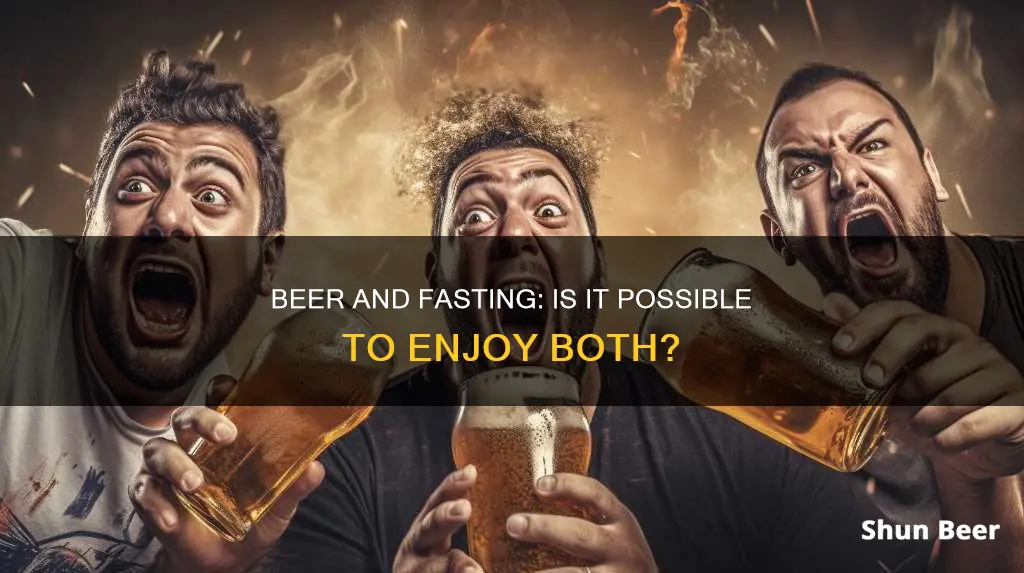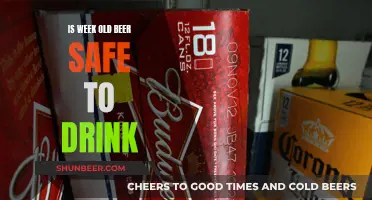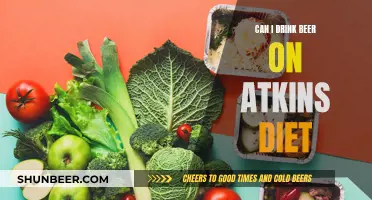
Drinking alcohol while fasting is a tricky topic. It depends on the type of fasting and the amount of alcohol consumed. If you are intermittent fasting, you can drink alcohol in moderation during your eating window without negatively impacting your fasting state. However, drinking during the fasting window will break your fast as alcohol contains calories. While moderate alcohol consumption may not affect health or fasting results, excessive drinking can lead to weight gain and health issues. Alcohol can also stimulate appetite and lead to overeating, which may hinder weight loss goals. Therefore, it is recommended to prioritise low-calorie alcoholic drinks and always consume alcohol with food to avoid dehydration and drunkenness.
| Characteristics | Values |
|---|---|
| Can you drink beer while fasting? | Yes, but only during the eating window. |
| Can you drink alcohol while fasting? | Yes, but only during the eating window. |
| Can you drink alcohol during the fasting window? | No, it will break your fast. |
| What are the best types of alcohol to drink while fasting? | Dry, lower-alcohol wine, hard spirits (like vodka, gin, or tequila) mixed with sparkling water, light beer, red or white wine, and champagne. |
| What are the worst types of alcohol to drink while fasting? | Cocktails, sweet wines, craft beer, dessert wine, and creamy, sugary drinks. |
| How much alcohol can you drink while fasting? | Moderate consumption is defined as no more than 1 drink per day for women and no more than 2 per day for men. |
| What are the effects of drinking alcohol while fasting? | Alcohol can impede fat burning, slow weight loss, increase the risk of inflammation and other health issues, and prevent cellular repair. |
What You'll Learn

Drinking beer during a fasting window will break your fast
During a fast, you are supposed to avoid all foods and beverages for a set amount of time. Intermittent fasting is meant to promote hormonal and chemical changes, such as fat burning and cellular repair, that may benefit your health.
Alcohol is calorie-dense, with one gram providing 7 calories. Alcohol also contains more calories per gram than carbohydrates and protein. This means that any amount of alcohol during a fasting period will break your fast.
Drinking on an empty stomach is never a good idea. Alcohol can be absorbed into your system faster, and you can become drunk quicker. Drinking when fasting can also lead to severe dehydration.
Alcohol can also stimulate overeating, which can lead to weight gain over time. Alcohol may also increase your appetite, leading to higher calorie consumption. Alcohol itself is a high-calorie drink, and it can be easy to miss these extra calories if you are not tracking your drinking.
Excessive alcohol intake may also promote inflammation, which can lead to various illnesses such as heart disease, type 2 diabetes, and certain cancers. Alcohol can also prevent cellular repair, which may reduce your risk of cancer and promote anti-aging effects.
Therefore, if you are intermittent fasting, it is best to avoid drinking beer during your fasting window.
Does Helium Beer Work? The Science Behind It
You may want to see also

Beer is calorie-dense, with 153 calories per average beer
Beer is a calorie-dense drink, with the average beer containing 153 calories. To put that into context, a gram of alcohol contains 7 calories—that's a little more than a gram of sugar and a little less than a gram of fat. This means that beer is not suitable for consumption during a fasting window.
Alcoholic drinks are usually high in calories, so if you're intermittent fasting, it's best to limit your alcohol intake to the eating window. Even then, it's important to be mindful of how much you're drinking and when. For the best results, it's not recommended to drink consistently during a fasting-based food routine, even in moderation.
Alcohol is a calorie-dense drink, and it won't mesh with your fasting window. It can also add significantly to the total calories consumed during your eating window. This is especially true for beer, which tends to be more calorie-dense than other alcoholic drinks such as wine or spirits.
If you're intermittent fasting for weight loss, it's important to be aware that alcohol may lead to overeating and craving less nutrient-dense foods. Alcohol can stimulate appetite and lead to increased calorie consumption. It can also lower your inhibitions and make fasting more challenging.
In addition to the calories, the type of alcohol you choose matters too. Not all alcohol is created equal—certain drinks and spirits may contain some nutritional benefits and are less caloric than others. For example, red and white wine, champagne, light beer, and clear spirits are lower in calories and often contain beneficial compounds called polyphenols, which have antioxidant properties.
So, can you drink beer while intermittent fasting? The answer is yes, but only during your eating window and in moderation. It's important to be mindful of how much and how often you're drinking beer, as excessive alcohol consumption can undermine the success of intermittent fasting and lead to weight gain and other negative health outcomes.
Beer and Diverticulitis: What You Need to Know
You may want to see also

Alcohol can impede fat burning
Secondly, when alcohol is consumed, the body prioritises metabolising it over other nutrients, meaning that it is burned first as a fuel source before the body uses anything else. This includes glucose from carbohydrates or lipids from fats. The excess glucose and lipids are then stored as fat. This process can take the body up to 36 hours, during which time the body will not be burning any fat.
Thirdly, alcohol can affect the liver, which plays a crucial role in metabolising fats, carbohydrates, and proteins. Excess alcohol consumption can lead to alcoholic fatty liver, which can damage the liver and affect how the body metabolises and stores carbohydrates and fats.
Fourthly, alcohol can contribute to excess belly fat. Foods and drinks high in simple sugars, such as beer, are also high in calories, and these extra calories are stored as fat in the body, often in the abdominal area.
Fifthly, alcohol can affect judgement and lead to poor decision-making when it comes to food choices. Alcohol lowers inhibitions and can trigger hunger signals in the brain, leading to an increased urge to eat more food.
Finally, alcohol can negatively affect sleep, leading to sleep deprivation, which can disrupt the balance of hormones related to hunger, satiety, and energy storage.
Hotel Drinking: Beer Rules and Room Service
You may want to see also

Drinking on an empty stomach is never a good idea
If you are intermittent fasting, you should also be aware that alcohol is a calorie-dense drink. One gram of alcohol contains 7 calories—more than a gram of sugar and almost as many as a gram of fat. This means you can't drink alcohol during your fasting window.
Alcohol can also increase your appetite, so you may find yourself eating more during the eating phase of your intermittent fasting, which will offset the effects of calorie restriction during the fasting phase. Alcohol is also a high-calorie drink, and it's easy to lose track of how much you're consuming.
If you're intermittent fasting for weight loss, it's important to remember that alcohol may decrease the long-term success of your weight loss journey. Alcohol may stimulate overeating, especially after you've taken your first bite, and it may increase levels of the hormone that makes you feel hungry. It may also lead to cravings and less health-promoting food choices during your eating windows.
If you're going to drink alcohol while intermittent fasting, it's best to do so in moderation and during your eating window. It's also a good idea to eat something and drink plenty of water before drinking alcohol.
Beer and Melatonin: A Safe Mix?
You may want to see also

Drinking in moderation during eating windows is fine
Firstly, it's important to understand that drinking alcohol during a fasting window will break your fast. This is because alcohol is calorie-dense, with one gram of alcohol containing seven calories. This is more than a gram of sugar and almost as much as a gram of fat.
However, drinking in moderation during your eating window won't negatively impact your fasting state. According to the CDC, moderate drinking is defined as up to two drinks a day for men and one for women.
It's also worth noting that not all alcohol is created equal. Some drinks, like red wine, champagne, light beer, and clear spirits, are less caloric than others. These drinks also contain polyphenols, which are plant-based compounds that offer health benefits like reducing inflammation.
That being said, alcohol can stimulate appetite and lead to overeating, which can hinder weight loss. It can also interfere with glucose metabolism and prevent cell repair, so it's important to be mindful of your drinking habits and consume alcohol in moderation.
Beer and Yeast Infections: Is It Safe to Drink?
You may want to see also
Frequently asked questions
Yes, you can drink beer while intermittent fasting, but only during your "eating window". Drinking during your fasting window will break your fast.
Intermittent fasting is a dieting method that involves switching between fixed eating and fasting periods. During the fasting period, you can't consume anything that contains calories.
Alcohol is calorie-dense, so it will add to your total calorie consumption. It can also stimulate your appetite, leading to overeating and weight gain.
Moderate alcohol consumption may not negatively impact your fasting results and can complement the benefits of intermittent fasting. It has also been associated with a reduced risk of heart disease or type 2 diabetes in men.







